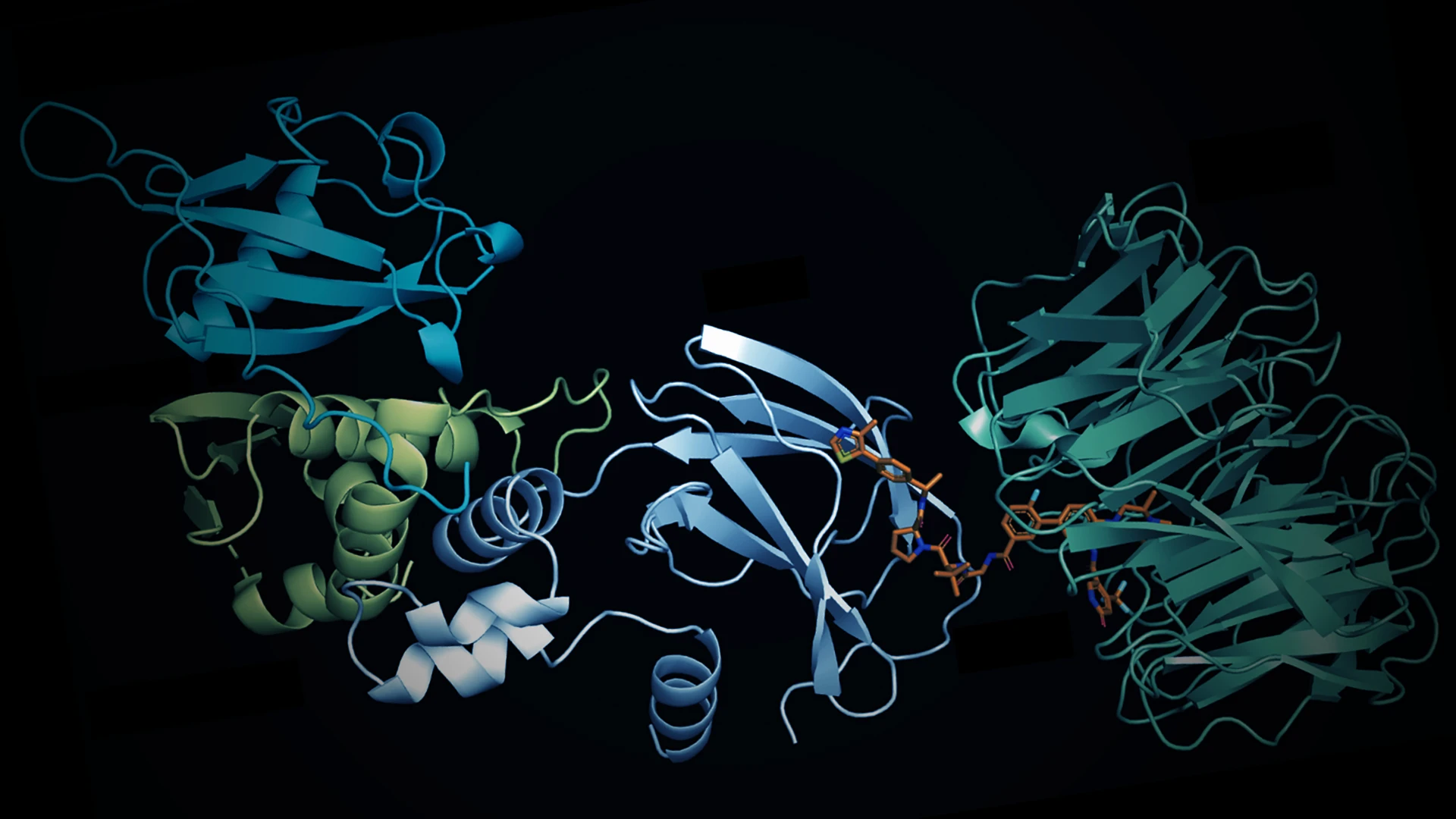Targeted protein degradation (TPD), in which disease-causing proteins can be depleted in cancer cells, has emerged in recent years as one of the hottest fields in cancer drug discovery. Among its leaders and pioneers is Jian Jin, PhD, Co-Leader of the Cancer Clinical Investigation Program at TCI. Dr. Jin’s lab has created numerous novel degraders of a wide range of oncogenic proteins, including transcription factors that, for decades, were considered undruggable. The lab has also developed cutting-edge technologies for advancing the TPD field.
“Transcription factors represent a major class of therapeutic targets for cancer, but the majority of them can’t be effectively targeted by small-molecule inhibitors because they lack the binding pockets that normally exist in kinases or other enzymes,” Dr. Jin explains.

Jian Jin, PhD, with postdoctoral fellow Xiaoping Hu, PhD, discussing models that could be applicable for the novel PROTAC degraders being developed.
His team developed a novel technology that advances the new therapeutic modality class known as proteolysis targeting chimeras (PROTACs), which hijack the cellular ubiquitin-proteasome system to induce degradation of the target proteins. Dr. Jin’s platform, called TF-PROTAC, targets transcription factors (TF) by linking a DNA oligonucleotide to an E3 ligase ligand, taking advantage of the fact that most TFs bind to specific DNA sequences to regulate gene transcription.
TF-PROTAC can effectively degrade transcription factors that don’t have any small-molecule binding sites, thus providing a universal strategy for targeting most undruggable transcription factors, Dr. Jin says.
In addition, Dr. Jin’s lab has created a number of novel and highly effective small-molecule degraders targeting a large variety of oncogenic proteins.
MS21

Dr. Jin and his team are currently optimizing the degraders to enter into the clinical setting for a variety of cancers, including breast cancer and leukemia.
One of the small-molecule degraders that Dr. Jin is most excited about is MS21, a PROTAC degrader that acts on AKT kinase, which is overly active in many cancers. As Dr. Jin and co-author Ramon Parsons, MD, PhD, Director of TCI and the Ward-Coleman Chair of Cancer Research, reported in Cancer Discovery in December 2021, MS21effectivelydegraded AKT, inhibited downstream signaling, and was much more effective in suppressing cancer cell growth in vitro and in vivo, compared to AKT enzymatic inhibitors.
The study also discovered that PTEN-PI3K pathway-mutant cancers with wild-type KRAS and BRAF proteins were highly sensitive to AKT degradation. That in turn provided a strong foundation for development of a small-molecule AKT degrader for treating a large percentage of all human cancers.
“Translation into the clinic is always our primary goal to ensure that cancer patients benefit from our research,” states Dr. Jin, Mount Sinai Endowed Professor in Therapeutics Discovery and Professor of Pharmacological Sciences, Oncological Sciences, and Neuroscience at the Icahn School of Medicine at Mount Sinai. The team believes it is getting closer to advancing an AKT degrader as a drug candidate for clinical trials, he adds.
MS1943
Dr. Jin and his team are also highly encouraged by the progress they’ve made with MS1943. The team has made the first-ever degrader of EZH2, a histone-lysine methyltransferase, orally bioavailable and is developing it further.
The methyltransferase is a key oncogenic driver of triple-negative breast cancer (TNBC)—the deadliest of its type—and of mixed-lineage leukemia-rearranged (MLL-r) leukemia, which is more common in children and has a poor response to standard treatments.
Their progress builds on their findings, first published in Nature Chemical Biology in December 2019, that MS1943 effectively suppressed the proliferation of TNBC cells in vitro and in vivo, while EZH2 enzymatic inhibitors didn’t.
MS177
Partnering with the lab of Greg Wang, PhD, at the University of North Carolina-Chapel Hill, Dr. Jin’s lab also created a novel PROTAC degrader of EZH2, MS177. It effectively targeted both canonical and non-canonical oncogenic functions of EZH2 in MLL-r leukemia and suppressed the progression of leukemia in multiple in vivo models, with study findings published in Nature Cell Biology in February 2022.
Researchers are currently optimizing these EZH2 degraders to advance them to the clinic for TNBC and MLL-r leukemia patients.
MS67

A rendered model of the crystal structure of the MS67 complex.
The collaboration between Drs. Jin and Wang on MS67, a PROTAC degrader of the protein WDR5, was recognized with a major grant in May 2022 from the National Cancer Institute.
The degrader provided strong evidence, first reported in Science Translational Medicine in September 2021, that pharmacological degradation of WDR5 is effective and superior to pharmacological inhibition of the protein for the treatment of WDR5-dependent cancers, including MLL-r leukemia. MS67 was able to significantly suppress tumor growth, prolong survival, and degrade WDR5 in vivo.
Harnessing the E3 Ligase KEAP1 for TPD
The Jin Laboratory has also made progress on leveraging KEAP1, an E3 ubiquitin ligase, for protein degradation, to overcome a bottleneck in TPD given the lack of accessible E3 ligase ligands. Dr. Jin and his team have generated proof-of-concept evidence, published in the Journal of the American Chemical Society in September 2021, that MS83, a KEAP1-recruiting PROTAC, effectively degraded targeted proteins.

Dr. Jin is working with postdoctoral fellow Luo Kaixiu, PhD, on the PROTAC degraders, which have the ability to make undruggable transcription factors targetable.
“We expect the breathtaking pace of discovery within targeted protein degradation will continue to accelerate,” says Dr. Jin, “and that more degraders will enter clinical development with excellent prospects of becoming effective cancer therapeutics for patients.”
Featured

Jian Jin, PhD
Co-Leader of the Cancer Clinical Investigation Program
